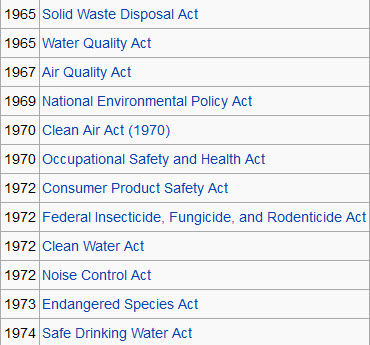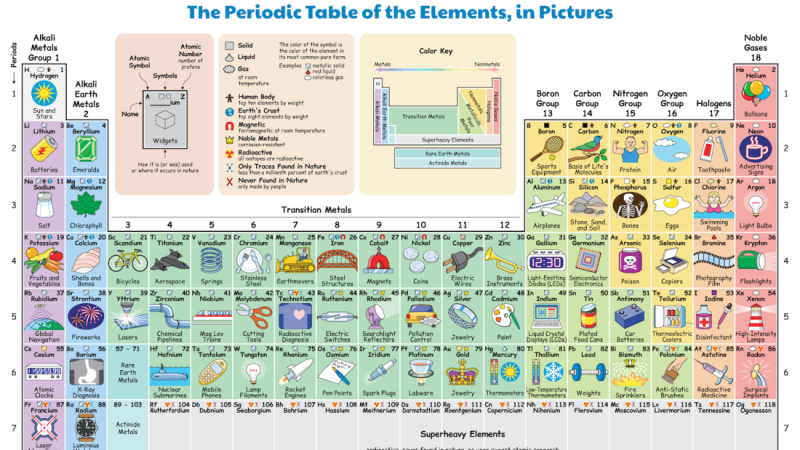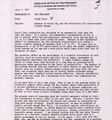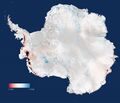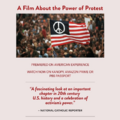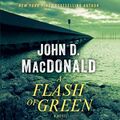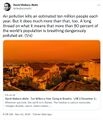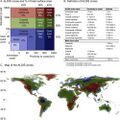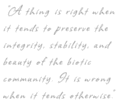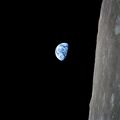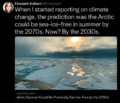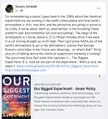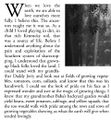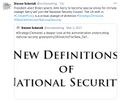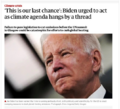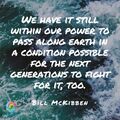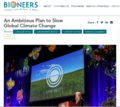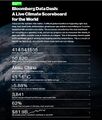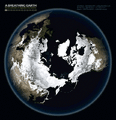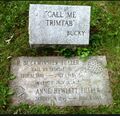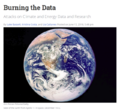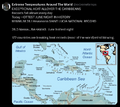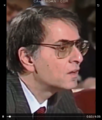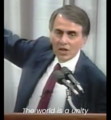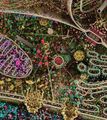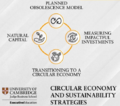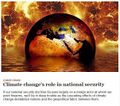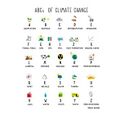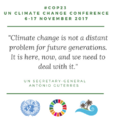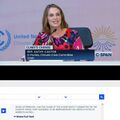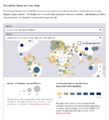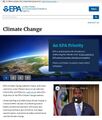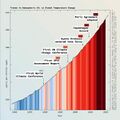Category:Ecology Studies: Difference between revisions
Siterunner (talk | contribs) No edit summary |
Siterunner (talk | contribs) No edit summary |
||
| Line 11: | Line 11: | ||
As societies search for ways to become more sustainable, Fritjof Capra suggests incorporating the same principles on which nature’s ecosystems operate. In his essay, “Speaking Nature’s Language: Principles for Sustainability” from the book Ecological Literacy, he leaves a blueprint for building a more resilient world on the foundation of natural concepts, such as interdependence and diversity. | As societies search for ways to become more sustainable, Fritjof Capra suggests incorporating the same principles on which nature’s ecosystems operate. In his essay, “Speaking Nature’s Language: Principles for Sustainability” from the book Ecological Literacy, he leaves a blueprint for building a more resilient world on the foundation of natural concepts, such as interdependence and diversity. | ||
Green ideas and writings of Dr. Capra and Charlene Spretnak were keys to the start up of the Green Party: [https://www.greenpolicy360.net/w/File:Green_Politics_by_Charlene_Spretnak_and_Fritjof_Capra.jpg GREEN POLITICS]: The Global Promise by Charlene Spretnak and Fritjof Capra | |||
"It's All Connected" / [https://www.greenpolicy360.net/w/File:Relational_Reality.jpg Relational Reality] | [https://www.greenpolicy360.net/w/File:Relational_Reality_by_Charlene_Spretnak.png Green Values / "It's All Connected"] / [https://www.greenpolicy360.net/w/File:Relational_Reality.jpg Relational Reality] by Charlene Spretnak | ||
Revision as of 19:40, 10 November 2019
<addthis />
Teaching Ecological Literacy
As societies search for ways to become more sustainable, Fritjof Capra suggests incorporating the same principles on which nature’s ecosystems operate. In his essay, “Speaking Nature’s Language: Principles for Sustainability” from the book Ecological Literacy, he leaves a blueprint for building a more resilient world on the foundation of natural concepts, such as interdependence and diversity.
Green ideas and writings of Dr. Capra and Charlene Spretnak were keys to the start up of the Green Party: GREEN POLITICS: The Global Promise by Charlene Spretnak and Fritjof Capra
Green Values / "It's All Connected" / Relational Reality by Charlene Spretnak
From the Bioneers / If anyone has learned to speak nature’s language, it is Fritjof Capra. A founding director of the Center for Ecoliteracy and currently chair of its board, he has distinguished himself over the past forty years as a scientist, systems theorist, and explorer of the philosophical and social ramifications of contemporary science.
Introducing Dr. Capra to an overflow audience at a Bioneers Conference plenary, Kenny Ausubel speaks of physics, connectivity, and eco-undertanding:
“One of Fritjof Capra’s greatest gifts is his ability to digest enormous amounts of information from highly complex, wide-ranging fields of inquiry. Not only does he explain them elegantly and clearly, but he distills their essence and sees their implications. Because he’s a credentialed scientist who did his time with particle accelerators all over Europe and the United States, Fritjof never overstates his case or lapses into wishful thinking.”
After receiving his Ph.D. in theoretical physics from the University of Vienna in 1966, Capra did research in particle physics at the University of Paris, the University of California at Santa Cruz, the Stanford Linear Accelerator Center, Imperial College of the University of London, and the Lawrence Berkeley Laboratory at the University of California. He also taught at UC Santa Cruz, UC Berkeley, and San Francisco State University.
He is the author of five international bestsellers: The Tao of Physics (1975), The Turning Point (1982), Uncommon Wisdom (1988), The Web of Life (1996), and The Hidden Connections (2002). He coauthored Green Politics (1984), Belonging to the Universe (1991), and EcoManagement (1993), and coedited Steering Business Toward Sustainability (1995).
················································································
- Ecology Studies
Science and scientific thinking are critically important these days when science and expertise are too often being set aside.
The Commons", the protection and preservation of our home planet, must not be discounted and set aside." -- SJS / GreenPolicy360 Siterunner
- ○ ○ ○ ○ ○ ○ ○ ○ ○ ○ ○ ○ ○ ○ ○
Let's take a moment from our active lives and, as planet citizens, look back 'at the roots' of environmental, ecological studies. The classics, whole earth, the big picture, a vision of our Earth as our common home:
"This is a critical moment in the Earth’s history. Though reasonable people may debate the causes and disagree about what is to be done, there is little doubt that humanity faces significant, global environmental problems affecting the quality and sustainability of human, and non-human, life on this planet. At such an historical moment, Lawrence and other institutions of higher education have an obligation to respond."
-- "Green Roots" ... Lawrence University, Wisconsin, US
○ ○ ○ ○ ○ ○ ○ ○ ○ ○ ○
Dot Earth - 'The Knowosphere'
An Exercise to Sift for Sources Amid a Blitz of Misinformation and Fake News
- By Andrew C. Revkin / November 24, 2016
- https://en.wikipedia.org/wiki/Glossary_of_ecology | Glossary of Ecology
○ ○ ○ ○ ○ ○ ○ ○ ○ ○ ○ ○ ○ ○ ○ ○ ○ ○
Environmental Movement in the US
http://en.wikipedia.org/wiki/Environmental_movement_in_the_United_States
GreenPolicy: Modern Environmental Movement
The "golden era" of American environmental lawmaking in the 1960s and 1970s saw twenty-two pieces of major environmental legislation (including the Clean Air Act, the Clean Water Act, and the Endangered Species Act) passed by bipartisan majorities in Congress and signed into law by presidents of both parties. But since then partisanship, the dramatic movement of Republicans to the right, and political brinksmanship have led to legislative gridlock on environmental issues. In this book, Christopher Klyza and David Sousa argue that the longstanding legislative stalemate at the national level has forced environmental policymaking onto other pathways.
○
A Fierce Green Fire -- 2003 -- by Philip Shabecoff
When the Earth Moved -- April 15, Earth Day
- ··················································································································
Subcategories
This category has the following 45 subcategories, out of 45 total.
Pages in category "Ecology Studies"
The following 200 pages are in this category, out of 226 total.
(previous page) (next page)A
B
C
- C40 Cities Climate Leadership Group
- California is ahead of the game as Obama releases Clean Power Plan
- California out in front in a Green future
- Capitalism and the Environment
- Carbon Brief
- Citizen Science
- Climate Change - Global Warming Keyword-Terms
- Climate Change Denier Talking Points -- and Rebuttals
- Climate Change Summit Paris
- Climate Desk
- Climate Law Blog @Columbia Law School
- Climate migration
- Climate News
- Climate News Events Archive ... 1970 to Today
- Climate Plans Enforcement - Resources
- Climate Problems, Climate Solutions
- Conservation movement
- Copernicus EU
- Creatively Green
D
E
- Each of us can make a positive difference
- Earth and Space, Politics
- Earth at Night
- Earth Day 2020
- Earth Day Memories on the 50th Anniversary
- Earth from NASA
- Earth Science
- Earth Science Eco-Fields
- Earth Science Research from Space
- Earth Science Vital Signs
- EarthPOV
- Earthrise
- EarthTime
- Earthviews from Astronauts
- Eco-nomics
- Ecolivia
- Ecology
- Ecosystem
- Ecotourism
- Environmental agreements
- Environmental full-cost accounting
- Environmental Law, Rollbacks under Trump 2016-20
- Environmental Laws and Modern Environmental Movement
- Environmental movement
- Environmental protection
- Environmental Protection Agency
- Environmental Security Organizations
- Environmental Studies Online
- EOS eco Operating System
- ESA Living Planet Announcement - May 2022
- Ethics and Climate Change
- European Union Green Deal - Fit for 55
- Extinction
F
G
- GDP+
- Generation Green
- Genesis, Stewardship and Beyond
- George E. Brown Jr
- Glaciogenic Art
- Glasgow Climate Summit - Pledges, Promises, Declarations - What's Next Up
- Global Climate Action Summit
- Global Fishing Watch
- GN-z11
- Going Green: Texas v. Pennsylvania
- Google Earth
- Google Earth Timelapse
- GP360 NewPages
- Green AI
- Green Bank in Maryland - and More
- Green Best Practices
- Green Education
- Green Futurist Literary Writers
- Green Institute
- Green Marketing
- Green New Deal
- Green Policy domains
- Green Politics 360
- Green Politics with GreenPolicy360
- Green Quotes
- Green Stories of the Day
- Green Stories of the Day - GreenPolicy360 Archive
- GreenAction
- Greening Our Blue Planet
- GreenLinks
- GreenPolicy360 (eOS)
- GreenPolicy360 Archive Highlights 2013
- GreenPolicy360 Archive Highlights 2014
- GreenPolicy360 Archive Highlights 2015
- GreenPolicy360 Archive Highlights 2016
- GreenPolicy360 Archive Highlights 2017
- GreenPolicy360 Archive Highlights 2018
- GreenPolicy360 Archive Highlights 2019
- GreenPolicy360 Archive Highlights 2020
- GreenPolicy360 Archive Highlights 2021
- GreenPolicy360 Archive Highlights 2022
- GreenPolicy360 Archive Highlights 2023
- GreenPolicy360 Highlights
- GreenPolicy: Science
- GTN GreenLinks Trending News
I
L
M
N
P
- Permaculture Green Practices
- Permafrost
- Planet API
- Planet Citizen Action
- Planet Citizen Vision of Living Earth
- Planet Citizens
- Planet Citizens, Planet Scientists
- Planet Earth Perspective
- Planet of the Humans, a documentary film
- PlanetCitizen
- Pledge for Planetary Health via The Lancet
- ProjectDrawdownCO2
R
S
Media in category "Ecology Studies"
The following 200 files are in this category, out of 1,302 total.
(previous page) (next page)- 'Thin Blue Layer' of Earth's Atmosphere 2.jpg 800 × 486; 46 KB
- 'Thin Blue Layer' of Earth's Atmosphere m.jpg 426 × 240; 15 KB
- 1977 from the Office of Science and Technology Policy.jpg 661 × 711; 177 KB
- 2020 record temperatures.png 800 × 502; 358 KB
- 29 Days on the Edge w James Webb.png 527 × 461; 215 KB
- 3-15-2016 12-29-07 PM.png 538 × 701; 201 KB
- 33 false statements.png 640 × 91; 19 KB
- 3M lawsuit re forever chemicals - June 2023.png 603 × 600; 357 KB
- 43245326 2662602463753498 4405976459546460160 o.jpg 1,598 × 1,200; 163 KB
- 5 19 14 andrew antarcticaelevationchanges-640x547.jpg 640 × 547; 59 KB
- 7-20-2020 GreenPolicy360 RT No.2.jpg 591 × 510; 125 KB
- A Brief History of the Future - 2s.jpg 448 × 309; 70 KB
- A Fierce Green Fire.jpg 208 × 314; 13 KB
- A Film About the Power of Protest.png 800 × 801; 715 KB
- A Flash of Green by John D. MacDonald.jpg 400 × 400; 55 KB
- A land ethic .jpg 864 × 668; 79 KB
- A Planet Citizen View.png 799 × 1,241; 1.64 MB
- A root and its mycorrhizal fungus surroundings.PNG 315 × 382; 236 KB
- A Sand County Almanac, p23 geese-Leopold.png 456 × 790; 406 KB
- A scorching year, what about the 360 warming data.jpg 600 × 706; 106 KB
- AB 2480 Meadows and Forest Water Infrastructure.png 481 × 375; 248 KB
- About Baselines and Change.png 592 × 312; 33 KB
- About website of The Invading Sea.png 800 × 343; 126 KB
- Acceptance on behalf of the United States of America.png 448 × 306; 62 KB
- Act now for a livable future.png 501 × 275; 272 KB
- Acting to make a positive difference - in St Petersburg Florida.png 600 × 723; 645 KB
- Ag production and GHG emissions.jpg 680 × 510; 33 KB
- Against the Tide - Cover - by Cornelia Dean.jpg 308 × 475; 57 KB
- Air Pollution Kills, Injures, Cripples, Disables.jpg 600 × 697; 153 KB
- Alaska Willow - March 12 2023.png 576 × 230; 99 KB
- Alaska Willow News-March 12 2023.png 576 × 625; 235 KB
- Aldis zone blog.jpg 500 × 498; 67 KB
- Aldo quote.gif 309 × 280; 7 KB
- Algae release -nikon-small-world-competition-2017-winners.jpg 640 × 576; 89 KB
- All species day with homo sapien in Santa Fe .jpg 640 × 369; 98 KB
- Amazon fires burn across the rainforest.jpg 800 × 504; 76 KB
- Amazon-rainforest (2).jpg 600 × 338; 68 KB
- Amazon-rainforest (3).jpg 300 × 225; 57 KB
- Amazon-rainforest.jpg 814 × 459; 142 KB
- American Jobs Act compared w THRIVE Act (Green New Deal).jpg 674 × 798; 90 KB
- Andrew Wheeler confirmed to head EPA.jpg 753 × 600; 85 KB
- Antarctica-2018.jpg 768 × 1,024; 82 KB
- Anthro-transport via globaia.org.jpg 800 × 450; 444 KB
- Anthropocene bks016.png 800 × 248; 227 KB
- Anthropocene-550x360.png 550 × 360; 335 KB
- Anthropocene-crutzen.jpg 628 × 347; 79 KB
- Anthropocene-economist cover.jpg 750 × 320; 223 KB
- Anthropocene-nature March2015.jpg 747 × 407; 103 KB
- Anthropocene-the-geology-of-humanity.jpg 628 × 347; 79 KB
- AOC March 26, 2019.jpg 597 × 433; 58 KB
- AOC re climate task force - july 8 2020.jpg 585 × 203; 38 KB
- Apollo m.jpg 322 × 322; 30 KB
- Apollo.jpg 715 × 715; 102 KB
- Apple varietals.jpg 600 × 314; 30 KB
- April 22, 1970.jpg 800 × 431; 67 KB
- April 28, 2016.png 586 × 415; 159 KB
- Aquifers global earth observations by grace20150616-16 m.jpg 800 × 450; 117 KB
- Aquifers global earth observations by grace20150616-16.jpg 1,600 × 900; 317 KB
- Arable land percent world.png 1,357 × 628; 40 KB
- Arctic - Kolbert - 2023.png 553 × 476; 274 KB
- Arctic 30.1 C at 62.5 N.jpg 800 × 432; 80 KB
- Arctic heat in Russia-Siberia 2020.gif 784 × 408; 3.6 MB
- Arctic Melt - 1950-2020.png 640 × 349; 287 KB
- Arctic sea ice watch 25 yrs of ice cover change.png 697 × 386; 314 KB
- Arctic Siberia Heatwave - Again - June 2021.jpg 640 × 360; 83 KB
- Arctic-March30,2019.jpg 797 × 600; 126 KB
- Arctic-Siberia-6-20-2020.jpg 478 × 644; 148 KB
- AskNatureAvatar s.png 200 × 200; 14 KB
- Astro POV - Mike Massimino - PlanetCitizen.png 800 × 466; 792 KB
- Astro Samantha.png 448 × 266; 78 KB
- At Independence Hall - Sept 1, 2022.png 400 × 638; 416 KB
- At st peters endangered species.png 717 × 431; 242 KB
- Atmosphere Science.jpg 800 × 600; 45 KB
- Atmospheric Experiment of Humanity.jpg 519 × 574; 201 KB
- AU Too Hot.png 640 × 413; 286 KB
- Backbone of Night - The Milky Way by Andrew McCarthy 2023.png 796 × 1,722; 2.3 MB
- Bamboo-800x150.jpg 800 × 150; 34 KB
- Banking - finance - climate - Mann-1.jpg 452 × 640; 162 KB
- Banking - finance - climate - Mann-2.jpg 452 × 640; 164 KB
- BantheBag California-OutinFront.png 519 × 715; 449 KB
- Barrier island hubris 6-29-2021.jpg 490 × 635; 111 KB
- Battle for Democracy.jpg 640 × 123; 24 KB
- Be a planet citizen, make a choice, act to reduce climate change.jpg 1,024 × 595; 60 KB
- Be kind-2.jpg 250 × 164; 20 KB
- Bell hooks - when we love the earth.jpg 480 × 517; 128 KB
- Bernie Sanders, Senate 2.PNG 800 × 517; 379 KB
- Bernie Sanders, Senate Aug 3.PNG 800 × 518; 388 KB
- Best practice goals.png 487 × 82; 11 KB
- Beyond ludicrous politics in Florida March2015.png 761 × 251; 30 KB
- Biden - clean energy ambitions.JPG 640 × 334; 31 KB
- Biden announces EV policies - Aug 2021.jpg 600 × 604; 112 KB
- Biden introduces leadership team - Nov 24 2020.jpg 800 × 644; 173 KB
- Biden re Earth Day 2023.png 640 × 400; 155 KB
- Biden selects Kerry as special climate envoy.jpg 592 × 505; 87 KB
- Biden urged to act - Oct 18 2021 - The Guardian.png 663 × 600; 497 KB
- Biden's assembled an all-star climate team 4-21-2021.jpg 682 × 732; 309 KB
- Biden-Harris, CNN News Online - Nov 8, 2020.jpg 800 × 484; 114 KB
- Biden-Sanders Unity Task Force on Climate.jpg 701 × 780; 139 KB
- Big Oil Rocked by News May 27 2021.jpg 639 × 600; 84 KB
- Big Wobble 2020.jpg 507 × 342; 79 KB
- Biggest climate related legislation in history - 1.png 800 × 188; 68 KB
- Bill McKibben switches gears-Sept 2021.jpg 518 × 265; 78 KB
- Bill McKibben to next generations.JPG 700 × 700; 203 KB
- Bill Mollison 1928-2016.pdf ; 99 KB
- Bill Mollison courtesy of Permaculture magazine.jpg 460 × 300; 0 bytes
- Bill Mollison the day after his passing memories.png 1,381 × 651; 1.65 MB
- Bill Nelson on Global Temp Rise and Climate Change.png 640 × 353; 100 KB
- Bill Nye explains.jpg 543 × 508; 88 KB
- Bill Nye The Planet's on Fire.jpg 800 × 675; 106 KB
- Bill nye-march for science-earth day.jpg 800 × 533; 115 KB
- Biodiversity COP15 Conference - Dec 2022.png 640 × 417; 637 KB
- Biodiversity COP15 News - 1.png 600 × 687; 288 KB
- Biodiversity COP15 News - 2.png 600 × 636; 340 KB
- Biodiversity-by-dreamchaotic.jpg 600 × 173; 66 KB
- Bioneers - LDF-One Earth Plan.png 800 × 716; 781 KB
- Bioneers 35.png 480 × 528; 356 KB
- Biosphere EcoSearch.jpg 686 × 109; 32 KB
- Blog-soil.jpg 722 × 491; 58 KB
- Bloomberg Carbon Clock 10-26-2021 8-47-05 AM EST.png 800 × 195; 356 KB
- Bloomberg Live Climate Data Dashboard.jpg 640 × 756; 156 KB
- Blue Marble memories in 2022.png 768 × 969; 727 KB
- Blue Marble photo - Apollo 17.jpg 642 × 605; 129 KB
- Blue Marble photo taken by the crew of Apollo 17 (1972).jpg 642 × 605; 129 KB
- Breakpoint - Reckoning with America's Environmental Crisis.jpg 329 × 500; 49 KB
- BreathingEarth.gif 619 × 640; 2.97 MB
- Bridenstine talks.png 1,485 × 911; 223 KB
- Buckminster and a Geodesic Dome.jpg 600 × 600; 79 KB
- Bucky Trimtab.jpg 348 × 336; 88 KB
- Bug eyes in the rainforest canopy Photo by Don Perry-2.jpg 300 × 576; 24 KB
- Bug eyes in the rainforest canopy Photo by Don Perry.jpg 391 × 576; 27 KB
- Burning the Data.png 640 × 597; 434 KB
- Burst of climate denial as Trump presidency ends.jpg 632 × 604; 92 KB
- C02 in atmosphere chart-3.png 570 × 800; 133 KB
- C40logo.png 233 × 87; 8 KB
- CA ClimateLeadership-Cover-BioneersConf eBook.jpg 504 × 720; 172 KB
- California at the forefront of US environmental policies.png 600 × 450; 50 KB
- California's kelp forests and coastal biodiversity diminished.png 532 × 754; 307 KB
- Canary - 1.jpg 448 × 901; 144 KB
- Canary - 2.png 446 × 531; 264 KB
- Car heating and cooling.png 465 × 635; 261 KB
- Carbon Brief - Greenhouse gas levels 2021.png 640 × 436; 292 KB
- Carbon Footprint - BP-McKibben-Solnit-Aug2021.jpg 516 × 264; 66 KB
- Carbon Mapper - Launch - April 2021.jpg 800 × 323; 92 KB
- Cardinal directions m.png 250 × 250; 20 KB
- Caribbean Sea hot - June night 2024.png 676 × 600; 386 KB
- Carl Sagan at the Emerging Issues Forum - 1990.png 360 × 460; 192 KB
- Carl Sagan at the Emerging Issues Forum.png 747 × 600; 600 KB
- Carl Sagan, 1985.PNG 480 × 566; 331 KB
- Carl Sagan, the atmosphere unifies and connects all of our world.png 360 × 390; 229 KB
- Caroline Lucas-Green New Deal.jpg 584 × 391; 71 KB
- CASM Citizen Sci Air Monitor EPA.jpg 300 × 225; 59 KB
- CC - when we share video 2016.jpg 605 × 338; 30 KB
- CCS issues via Guardian opinion - July 2022.png 648 × 326; 83 KB
- Celebrating 50 Years of Landsat.png 600 × 610; 909 KB
- Cellular Landscape.jpg 300 × 336; 44 KB
- CFSV2 world temp July 3, 2023.png 600 × 800; 513 KB
- CH4 graph - 1980-2020.JPG 640 × 446; 22 KB
- Challenge of Acting for the Commons.png 700 × 548; 175 KB
- Change.jpg 800 × 473; 73 KB
- Changes in carbon dioxide per 1000 years - via Climate Central.jpg 682 × 424; 34 KB
- Chasing Coral.jpg 800 × 437; 65 KB
- ChatGPT talks of fighting climate denialism.png 707 × 747; 239 KB
- China Record Heat - August 2022.png 800 × 1,343; 812 KB
- Christianity green via christian courier.jpg 768 × 512; 216 KB
- Circular Economy - Sustainable Strategies.png 543 × 480; 328 KB
- Cisterns rebateprogram.jpg 628 × 390; 355 KB
- Citizen of the planet girl.jpg 400 × 265; 35 KB
- Citizens Climate Lobby - Save Our Future Act 2021.jpg 518 × 262; 77 KB
- Citizens Climate Lobby - Tampa Bay.jpg 586 × 515; 125 KB
- Climate Action 25th conf in Madrid.jpg 680 × 510; 22 KB
- Climate activist - Steven Schmidt - 1978 on.png 600 × 480; 174 KB
- Climate and National Security.jpg 603 × 533; 157 KB
- Climate Art ABCs - by Nicole Kelner.jpg 586 × 550; 51 KB
- Climate Books - 2020.jpg 800 × 450; 69 KB
- Climate cases on the rise - Nature, Sept 2021.png 800 × 562; 181 KB
- Climate Central graph-800000 yrs of CO2.jpg 800 × 613; 52 KB
- Climate Central.jpg 562 × 398; 70 KB
- Climate Change at EDX, taught by Michael Mann.jpg 800 × 452; 60 KB
- Climate Change Conf Nov 6-17.png 464 × 488; 107 KB
- Climate Change COP27 - Nov 11 2022 US Representatives.jpg 712 × 444; 54 KB
- Climate Change COP27 - Nov 11 Kathy Castor.jpg 712 × 710; 77 KB
- Climate Change in a Cloud.jpg 498 × 350; 152 KB
- Climate Change Laws - database collaboration.png 640 × 271; 76 KB
- Climate Change Laws of the World - database.PNG 768 × 845; 383 KB
- Climate Change Litigation Databases Climate Law.png 800 × 330; 73 KB
- Climate Change Poses a Widening Threat to National Security.png 600 × 781; 310 KB
- Climate change unique threat to national security.png 800 × 42; 20 KB
- Climate Change US EPA.jpg 600 × 703; 95 KB
- Climate Communication-2018 word chart.jpg 800 × 623; 111 KB
- Climate Conferences 1979-2020.jpg 768 × 768; 121 KB
- Climate course at SDG (2022) recd by Michael E Mann.png 639 × 522; 474 KB
- Climate Crisis - Emily Atkin Heated No. 1.jpg 537 × 453; 61 KB




